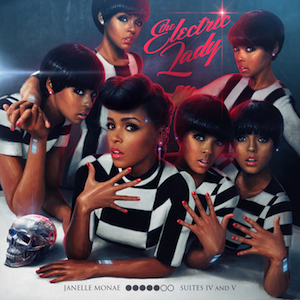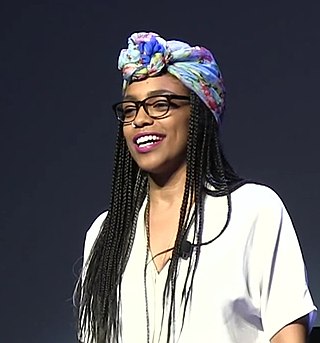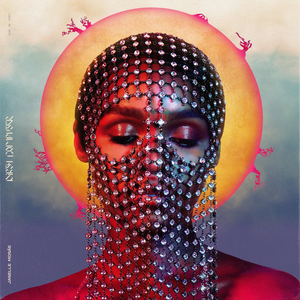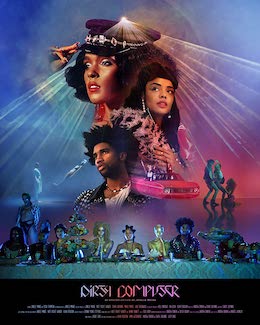Related Research Articles

Janelle Monáe Robinson is an American singer, songwriter, rapper and actress. She has received ten Grammy Award nominations, and is the recipient of a Screen Actors Guild Award and a Children's and Family Emmy Award. Monáe has also been honored with the ASCAP Vanguard Award; as well as the Rising Star Award (2015) and the Trailblazer of the Year Award (2018) from Billboard Women in Music.
Alan Ferguson is an American music video director. He is the son of the late Winifred Hocker Ferguson and the late William Alfred Ferguson Sr. His father was a U.S. Army veteran and a postal worker.

The Electric Lady is the second studio album by American singer and songwriter Janelle Monáe, released on September 6, 2013, by Wondaland Arts Society, Bad Boy Records and Atlantic Records. It is the follow-up to her critically acclaimed debut studio album, The ArchAndroid (2010), and likewise, received universal acclaim from music critics. This album serves as the fourth and fifth installments of her seven-part Metropolis concept series. Musically, The Electric Lady incorporates influences of hip hop soul, funk, gospel, jazz, rock, pop, and reggae.

#everyBODYisflawless is a music video featuring American plus-size fashion bloggers and models Gabi Gregg, Nadia Aboulhosn and Tess Munster, lip-synching to Beyoncé's 2013 song "Flawless". The video was released on May 7, 2014. It was created by Gregg to promote body positivity and acceptance in response to harassment.

"Electric Lady" is a song by American psychedelic soul and R&B singer Janelle Monáe featuring singer Solange. It was released on July 30, 2014 as the fourth and final single from Monáe's second studio album, The Electric Lady. It uses the "Sunny" chord progression.

"Q.U.E.E.N." is a song by American recording artist Janelle Monáe featuring the singer Erykah Badu. It was released on April 23, 2013, as the lead single from Monáe's second studio album, The Electric Lady. Stylized in the form of question and response, each line of the song has Monáe expressing her thoughts on subjects ranging from sexuality to religion. Prince, a mentor to Monáe, called the music video for "Q.U.E.E.N." the best music video of 2013.

"Hell You Talmbout" is a 2015 protest song by Janelle Monáe and the members of her Wondaland artist collective, including Deep Cotton, George 2.0, Jidenna, Roman GianArthur, and St. Beauty.

#SayHerName is a social movement that seeks to raise awareness for Black women victims of police brutality and anti-Black violence in the United States. The movement's name was created by the African American Policy Forum (AAPF). #SayHerName aims to highlight the gender-specific ways in which Black women are disproportionately affected by fatal acts of racial injustice. In an effort to create a large social media presence alongside existing racial justice campaigns, such as #BlackLivesMatter and #BlackGirlsMatter, the AAPF coined the hashtag #SayHerName in December 2014.
Tracy Clayton is an American writer whose work has been recognized by Fast Company, Ebony, and The Root, who described her as "a superstar” who “writes big, funny things." She served as the co-host of the BuzzFeed podcast Another Round. She hosts the Netflix podcast Strong Black Legends, for which she interviews African Americans in the entertainment industry about their craft. Clayton and Josh Gwynn co-host Pineapple Street Studio podcast Back Issue which reminisces on how moments in pop culture's past have shaped our present.

Heben Nigatu is an Ethiopian-American writer and the former co-host of BuzzFeed podcast Another Round which stopped broadcasting in 2017. She previously wrote for The Late Show with Stephen Colbert and is currently a staff writer for Desus & Mero on Showtime.
Arabelle Sicardi is an American feminist fashion and beauty writer.
Black Girl Magic is an entertainment, broadcast, and apparel brand, with a TV show and podcast of the same name, created in 2014 by Beverly Bond. Bond is an author, celebrity DJ, model and founder of the women's empowerment organization and acclaimed award show Black Girls Rock!®, established in 2006, which celebrates the power, beauty, and brilliance of black women. In 2014, Bond founded and trademarked Black Girl Magic for an apparel line and talk show she developed under BondVision Media, Inc., Bond's production company. Since 2015, Bond featured Black Girl Magic talks at the annual BLACK GIRLS LEAD Summit for teen girls in New York City. In 2018, Bond launched the Black Girl MagicPodcast to elevate the lived experiences of Black women. In 2019 Bond featured Black Girl Magic panels and talks at the inaugural BGR!FEST held at the Kennedy Center in Washington, DC.

Dirty Computer is the third studio album by American singer and songwriter Janelle Monáe, released on April 27, 2018, by Wondaland Arts Society, Bad Boy Records and Atlantic Records. It is the follow-up to her studio albums The ArchAndroid (2010) and The Electric Lady (2013) and her first album not to continue the Cindi Mayweather Metropolis narrative.

Bisexual lighting is the simultaneous use of pink, purple, and blue lighting to represent bisexual characters. It has been used in studio lighting for film and television, and has been observed in the cinematography of various films. While not all films, television shows, photographs, and music videos that use this lighting intend to portray bisexuality, many queer artists have deliberately used this color palette—which resembles that of the bisexual flag—in their work.
Jamie Broadnax is an American film critic, podcaster, and writer, known for founding and being editor-in-chief and CEO of the Black Girl Nerds community.
Nikki Nelms is an American hairdresser. She has worked with celebrities including Solange, Janelle Monáe, Zoë Kravitz, and Yara Shahidi. Her best known work includes the hair styling in Solange's "Don't Touch My Hair" and Janelle Monáe's hair in "Pynk". Nelms is known for using non-traditional materials and bold silhouettes in her styling.
Zeba Blay is a Ghanaian-American writer, film and cultural critic and former senior culture writer for The Huffington Post. She coined the hashtag #Carefree BlackGirl in 2013 and published her accompanying debut essay collection Carefree Black Girls: A Celebration of Black Women in Pop Culture in 2021.

Dirty Computer is a 2018 dystopian musical science fiction film. It serves as a visual companion to Dirty Computer, the third studio album by Janelle Monáe. Billed as an "emotion picture", Dirty Computer tells the story of android Jane 57821 and her struggles as she "attempts to break free from the constraints of a totalitarian society that forcibly makes [her] comply with its homophobic beliefs". The film was produced by Wondaland, Monáe's multimedia production company, and was directed by Andrew Donoho and Chuck Lightning, with the music video portions of the film directed by Donoho, Lacey Duke, Alan Ferguson, and Emma Westenberg.

The Memory Librarian: And Other Stories of Dirty Computer is a collection of short fiction by Janelle Monáe, written in collaboration with Yohanca Delgado, Eve L. Ewing, Alaya Dawn Johnson, Danny Lore, and Sheree Renée Thomas. The collection, which has been described as Afrofuturist and cyberpunk, is Monáe's debut literary work. It is based on the world of her 2018 album Dirty Computer, as well as the accompanying short film of the same name. The book has received critical acclaim.
References
- ↑ Jones, Deja (2 April 2015). "The Struggle To Be A Carefree Black Girl". Madame Noire. Retrieved 30 August 2016.
- ↑ Mooney, Heather. "Sad Girls and Carefree Black Girls: Affect, Race,(Dis) Possession, and Protest." WSQ: Women's Studies Quarterly 46.3 (2018): 175-194.
- ↑ Bustos, Kristina (10 March 2015). "Beyond the Black Girl Nerds Hashtag". Riveter. Retrieved 29 August 2016.
- ↑ Sharp, Diamond (August 9, 2014). "Why Carefree Black Girls Are Here to Stay". The Root. Retrieved 29 August 2016.
- ↑ Johns, Jamala (January 30, 2014). "Carefree Black Girls - Solange, Janelle Monae". Refinery29. Retrieved 29 August 2016.
- ↑ Coker, Hillary Crosley (January 31, 2014). "So, What's This 'Carefree Black Girl' Thing All About?". Jezebel. Retrieved 3 September 2016.
- ↑ St. Félix, Doreen (September 27, 2016). "On Carefree Black Boys". MTV News. Archived from the original on September 28, 2016. Retrieved 2017-05-28.
- ↑ Blay, Zeba (5 June 2015). "How Boys Like Jaden Smith Are Redefining Black Masculinity". The Huffington Post. Retrieved 29 August 2016.
- ↑ "#CarefreeBlackKids2k16 offers comfort in wake of U.S. shootings". CBC News. July 9, 2016. Retrieved 3 September 2016.
- ↑ Mangum, Trey (8 July 2016). "#CarefreeBlackKids2k16 is the bright light we needed after this troubling week -". Blavity. Retrieved 3 September 2016.
- ↑ BCB Team (14 June 2016). "This Youtuber Says She's Not Here For The 'Carefree Black Girl' Movement". Beyond Classically Beautiful. Retrieved 29 August 2016.
- ↑ Shamira, Ibrahim (March 11, 2016). "Why I'm Over the 'Carefree Black Girl' Label". The Root. Retrieved September 3, 2016.